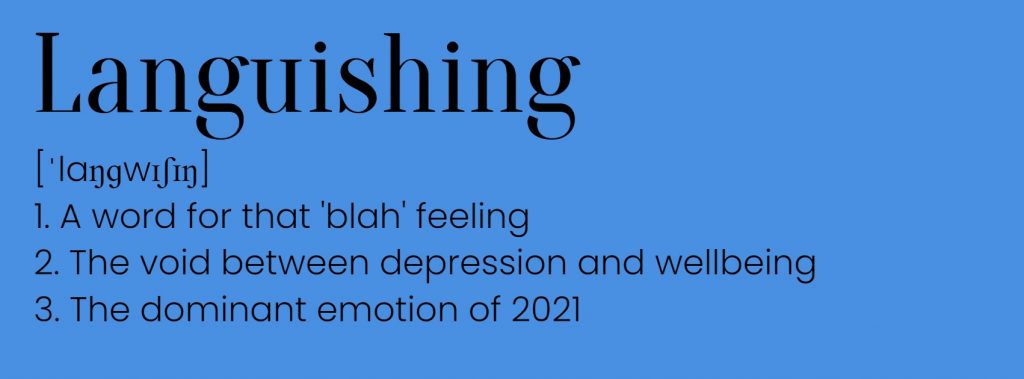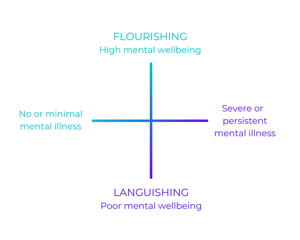Languishing To Flourishing | 3 Ways To Identify Purpose

Does ‘I’m OK, but I’m not OK’, ‘I’m feeling indifferent, unmotivated’, or ‘blah’ sound or feel familiar to you? It may be that you are in a state of languishing.
Languishing – a term coined by sociologist Corey Keyes – is the void between depression and wellbeing. You might not have symptoms of mental illness, but neither are you the poster model for mental wellbeing. It is the state we can slip into when we have ground to a halt, when our motivation is dulled, our focus disrupted and lives interrupted.
Languishing, unsurprisingly, may well be the dominant emotion of 2021.
So what exactly is languishing? What influences it, and why is it important to notice when you, or someone you know, is languishing?

Languishing is a prolonged experience of a mix of emotions that can include a sense of stagnation, apathy, restlessness, boredom and lack of presence.
As the world we knew changed dramatically since the beginning of Covid, our lives and the pace we live our lives also changed. Some changes were chaotic, unpredictable and immediate – we suddenly couldn’t see families and friends, suddenly didn’t feel safe and suddenly had to change the way we worked and socialised.
Other changes were slow and predictable – we stayed in the same location for months on end and spoke with the same people.
These changes and experiences undoubtedly had an effect on our emotional systems. And now 2 years on from the start of Covid, many of us are feeling stagnated, unsure if life can get back to normal or indeed how to feel back to normal.
Knowing what languishing is, is important. If you can’t label or recognise your suffering, it is a lot harder to seek help for it. Part of the danger when languishing is that you can become indifferent to your own indifference.
But whilst we might be ‘OK’, languishing is not a mental state we want to stay in. Those who experience prolonged languishing now may be at more risk of developing mental health problems in the future. By exploring your experience of languishing, you can identify ways to get back on your path to flourishing.
Below we will explore three factors that may be influencing a sustained experience of languishing. We encourage you to read and reflect on them, and how they might relate to your own experiences.

3 Factors Of Languishing
Lack of Purpose
Two common feelings within languishing are restlessness and boredom – you want to do things and you have the energy to, but at the same time you are unmotivated, not sure where to place the motivation, or what to focus on. The underlying factor to these experiences may be a lack of purpose.
For a lot of us, Covid meant the usual things we draw purpose from – such as making plans, seeing friends and family, working, having a variety of experiences – were taken from us, and we were left with a sense of something missing in our lives.
An underlying lack of purpose can affect multiple areas in your life, such as feeling unfulfilled in your relationships with others, disaffected at home and at work or feeling unable to find enjoyment in the things that used to bring you pleasure.
Many of us during lockdowns, and still now, are not sure of the direction our lives are going. We may have ruminative thoughts about what our life looks like now and what it could have looked like if it weren’t for covid.
Without the direction and purpose we are used to in our lives, we can be left feeling as if there is no drive to do the things we used to. We have the energy, but why bother? What is the point? We can feel directionless and a bit numb. In other words, we begin to languish.
Loss of Identity
Languishing can also be a result of a loss of identity.
For many of us, our identities changed as a result of covid. The things we hold close to our hearts, the things that make us who we are, changed. Our circumstances changed, our families changed, our lifestyles changed.
These things are important for building, maintaining and developing our self-identity and if they are changed in some way, that is often reflected in our sense of self. We can become detached from our sense of self. Whilst this may not have been a drastic shift in a sense of identity, it may have been enough for us to lose touch with ourselves.
Your emotional state depends on how you feel about yourself, but what happens if ‘how you feel about yourself’ is in flux? It may be that your identity is being challenged or changed and you may not have had time to notice and readjust. In the meantime, your emotional systems may also be in flux – neither here nor there… languishing.

Lull in Presence
When we have purpose and a strong sense of who we are, it can be easier to apply focus and awareness to our everyday lives. However when our purpose has been temporarily taken away, we can feel adrift and find it difficult to place our focus and attention.
The same goes for our identity, if we feel detached from ourselves it can feel as if we are lacking a sense of presence in the things we do.
Throw into the mix the boredom and sometimes fear we’ve been experiencing throughout the pandemic and there are the perfect conditions for a lull in presence. This can feel as if you’re in a slight haze or not quite connected to your surroundings.
Feeling detached from your surroundings can be a big part of languishing.

3 Ways To Flourishing
Understanding what languishing is and exploring some of the deeper themes related to languishing can help you to truly identify what it is you have been feeling. This is an important step in the journey from languishing to flourishing, as to move forward we must first understand where we are.
If you picture languishing on a mental health spectrum, it would be central between depression and flourishing. When languishing, we may not be suffering from any mental health issues, but neither are we living our lives with a sense of enjoyment, purpose and meaning.
So how can we move from languishing and into flourishing?
Everyone’s path is different, and often not linear. We may have good days and bad days , or feel like we’re moving forward and then suddenly ‘hit’ with a wave of languishing again. However, there are some simple commitments you can make to yourself in order to help you on your path to flourishing:
1. Focus on a small goal
To transcend languishing, start creating small goals for yourself. Creating and working towards your goals can engage your brain in finding purpose and motivation. There is no purpose or goal too small, in fact often, the more realistic and achievable your goal, the more engaged you will be to achieve it.
Setting goals that are in line with your identity or ‘ideal self’ can be particularly useful for banishing languishing, as they can encourage you to work towards something that is both meaningful and engaging whilst reconnecting you with your sense of self.
Sometimes it’s a small step toward rediscovering some of the energy
and enthusiasm that you’ve missed during all these months.
2. Give yourself some uninterrupted time
We may have had a lot of spare time during the pandemic, but how much of that was ‘dead’ time, or time that wasn’t spent doing anything?
To combat restlessness and apathy, try blocking out some time each day to be dedicated and focused towards something – an interesting project, a worthwhile goal, a meaningful conversation, or maybe just uninterrupted time to do work.
Whatever it is you choose to spend your time doing, you need to set some boundaries for yourself. Don’t let small tasks distract you or pull you away – commit to spending this time on what it is you need it for.
Treat your uninterrupted blocks of time as treasures to guard. This can help to clear out constant distractions and gives you the freedom to focus.
Bringing focused time back into your day – even if just for a dedicated 10 minutes – can also help with the lack of presence you may have been feeling.
3. Explore variety
Languishing can come from experiencing too much ‘sameness’. During covid, a lot of us have experienced for months on end the same scenery, same routine, even the same seating position!
Re-introducing some variety in your day can work wonders. Novel experiences do not always have to be grand and epic. Learning something new, seeing something from a different perspective or simply trying one new thing can re-engage your creativity and interest in the world around you.
Walking to the park, getting out for day trips where possible or getting to the gym are just some of the ways you can increase variety, get moving and combat the lethargy and boredom that accompanies languishing.
Exercise, including light exercise such as walking, can also work wonders to clear your head of the mental fog.
Another way to embrace variety can be through a change in diet.
The food you eat has a large influence on your mood, energy levels and mental clarity. To support your path to flourishing, try changing up your diet to incorporate foods and meals that support stable energy release and good mood. You can read more about this here.
YOU ARE NOT ON YOUR OWN
Languishing is a very real and unpleasant experience to go through and unfortunately, so many of us are very familiar with this feeling.
Just because you may feel ‘ok’ when you’re languishing doesn’t mean you can’t reach out. Therapy can also be a really useful support to help you to explore and make sense of your experiences.
Online Therapy & Counselling
Learn more about Uncategorised
Here are some articles and blogs about uncategorised

